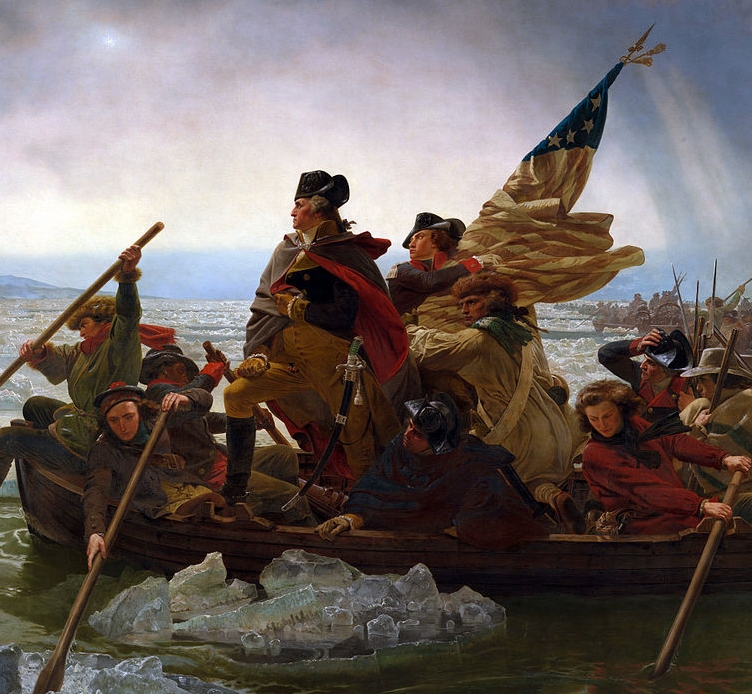 George Washington, ibid drexel.edu
By the all-powerful dispensation of Providence, I have been protected beyond all human probability or expectation; for I had four bullets through my coat, and two horses shot under me, and escaped unhurt, although death was leveling my companions on every side of me."
more...
[In the battle of Monongahela] ...As an officer, Washington was targeted by the Indians and the French and was fired on repeatedly. After having two horses shot out from underneath him, Washington chose to command the army from the ground. It soon became obvious that the English could not win the battle and Washington led the remaining men in a retreat. He brought the wounded Braddock back to Monongahela where Braddock died four days after the battle. After the battle, Washington found that there were four separate bullet holes in his clothes, yet not one of them had touched him. After the battle, George wrote a letter to his brother Jack, where he explained,
"By the all-powerful dispensation of Providence, I have been protected beyond all human probability or expectation; for I had four bullets through my coat, and two horses shot under me, and escaped unhurt, although death was leveling my companions on every side of me."
.... Fifteen years after the battle of Monongahela, Washington met the Native chief that commanded the Indians at that battle. … Washington was exploring the wilderness with a friend and found a group of Indians and the chief who were searching for Washington because the chief wanted to talk to him. Through an interpreter, the chief spoke these words about George Washington:
"I am a chief and ruler over my tribes. … I have traveled a long and weary path, that I might see the young warrior of the great battle. It was on the day when the white man's blood mixed with the streams of our forest, that I first beheld this chief. I called to my young men and said, 'Mark yon tall and daring warrior? He is not of the red-coat tribe - he hath an Indian’s wisdom, and his warriors fight as we do - himself alone is exposed. Quick, let your aim be certain, and he dies.' Our rifles were leveled, rifles which, but for him, knew not how to miss ... all in vain; a power mightier far than we shielded him from harm. He cannot die in battle. ...."
also see[iii]
less...
 Abraham Lincoln ourdocuments.gov
Yet, if God wills that it continue until all the wealth piled by the bondsman's two hundred and fifty years of unrequited toil shall be sunk, and until every drop of blood drawn with the lash shall be paid by another drawn with the sword, as was said three thousand years ago, so still it must be said "the judgments of the Lord are true and righteous altogether."
more...
Both parties deprecated war, but one of them would make war rather than let the nation survive, and the other would accept war rather than let it perish, and the war came. One-eighth of the whole population were colored slaves, not distributed generally over the Union, but localized in the southern part of it. These slaves constituted a peculiar and powerful interest. All knew that this interest was somehow the cause of the war. To strengthen, perpetuate, and extend this interest was the object for which the insurgents would rend the Union even by war, while the Government claimed no right to do more than to restrict the territorial enlargement of it. Neither party expected for the war the magnitude or the duration which it has already attained. Neither anticipated that the cause of the conflict might cease with or even before the conflict itself should cease. Each looked for an easier triumph, and a result less fundamental and astounding. Both read the same Bible and pray to the same God, and each invokes His aid against the other. It may seem strange that any men should dare to ask a just God's assistance in wringing their bread from the sweat of other men's faces, but let us judge not, that we be not judged. The prayers of both could not be answered. That of neither has been answered fully. The Almighty has His own purposes. "Woe unto the world because of offenses; for it must needs be that offenses come, but woe to that man by whom the offense cometh." If we shall suppose that American slavery is one of those offenses which, in the providence of God, must needs come, but which, having continued through His appointed time, He now wills to remove, and that He gives to both North and South this terrible war as the woe due to those by whom the offense came, shall we discern therein any departure from those divine attributes which the believers in a living God always ascribe to Him? Fondly do we hope, fervently do we pray, that this mighty scourge of war may speedily pass away. Yet, if God wills that it continue until all the wealth piled by the bondsman's two hundred and fifty years of unrequited toil shall be sunk, and until every drop of blood drawn with the lash shall be paid by another drawn with the sword, as was said three thousand years ago, so still it must be said "the judgments of the Lord are true and righteous altogether." 3 With malice toward none, with charity for all, with firmness in the right as God gives us to see the right, let us strive on to finish the work we are in, to bind up the nation's wounds, to care for him who shall have borne the battle and for his widow and his orphan, to do all which may achieve and cherish a just and lasting peace among ourselves and with all nations.
less...
Corporal Alvin York, WW1 (Not a Conscientious Objector??) 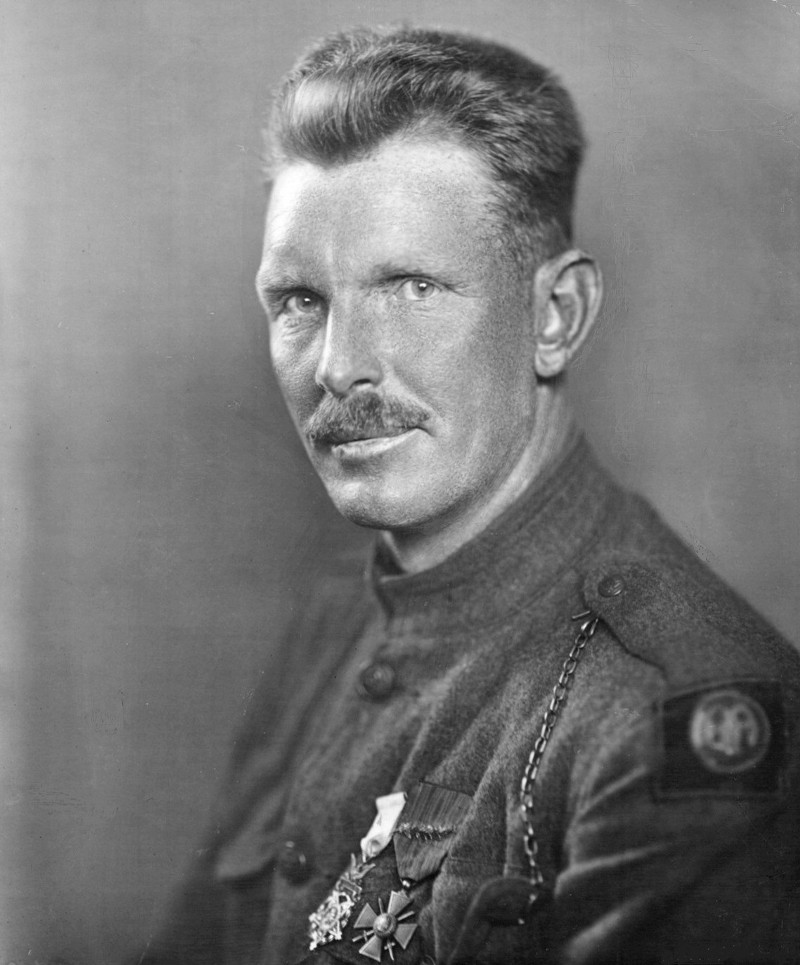
I never was a conscientious objector. I am not today. I didn't want to go and fight and kill. But I had to answer the call of my country, and I did. And I believed it was right. I have got no hatred toward the Germans and I never had.
more...
NOVEMBER 14, 1917 Jamestown, Tennessee: So later I sure received a card that said report to your local board. So I went to Jamestown and reported to the local board, … I was bothered a plenty as to whether it was right or wrong. … And I prayed and prayed. I prayed two whole days and a night out on the mountainside. And I received my assurance that it was all right, that I should go, and that I would come back without a scratch. I received this assurance direct from God. And I have always been led to believe that He always keeps his promise.
NOVEMBER 17, 1917 Camp Gordon: I was placed in the 21st training battalion, and there I was called out the first morning of my army life to police up in the yard all the old cigarette butts, ...… And my little old mother and Pastor Pile wanted to get me out. Pastor Pile put in a plea to the government that it was against the religion of our church to fight; and that he wanted to get me out on these grounds. And he sent his papers up the War Department, and then filled them out and sent them to me at the camp and asked me to sign them. They told me all I had to do was to sign them. And I refused to sign them, as I couldn't see it the way Pastor Pile did. My mother, too, put in a plea to get me out as her sole support. …… And so I never asked for exemption from service on any grounds at all. I never was a conscientious objector. I am not today. I didn't want to go and fight and kill. But I had to answer the call of my country, and I did. And I believed it was right. I have got no hatred toward the Germans and I never had.
less...
Desmond Doss: WW2 Conscientious Objector desmonddoss.com/bio/  Saved many lives as a medic, injured by grenade, refused to carry a weapon. Respected by his comrades. Subject of " Hacksaw Ridge".
more...
‘…One of these [Congressional Medals of Honor] was placed around the neck of a young Seventh-day Adventist, who during combat had not killed a single enemy soldier. In fact, he refused to carry a gun. His only weapons were his Bible and his faith in God. President Harry S. Truman warmly shook the hand of Corporal Desmond Thomas Doss, and then held it the entire time his citation was read aloud to those gathered outside the White House on October 12, 1945. " I'm proud of you," Truman said. " You really deserve this. I consider this a greater honor than being president." ...
less...
Kiyoshi Watanaabe: Japanese Imperial Army Amazon Review ($6.99 used) 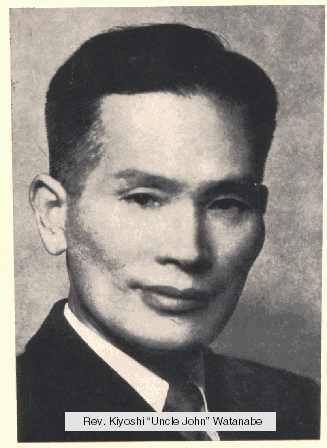 "...one of the British Army patients who came to know him was afterwards to write: 'I have read of many great Christians. I have met only one - John Watanabe.'".
more...
"Footprints", the memoirs of Sir Selwyn Selwyn-Clarke, is dedicated to The Reverend Kiyoshi Watanabe, it reads:
'This book is dedicated to The Reverend Kiyoshi Watanabe, formerly Officer Interpreter, Imperial Japanese Army, who helped to save lives of many British prisoners of war and British and Allied civilian men, women and children interned in Hong Kong during the Japanese occupation, 1941-1945, at the risk of losing his own. His wife and daughter were killed during the Allied bombing of Hiroshima on 6 August 1945'
...
less...
|
Yeshua ha Meschiach:
(To Pilate: "My kingdom is not of this world, or my servants would fight...")[i]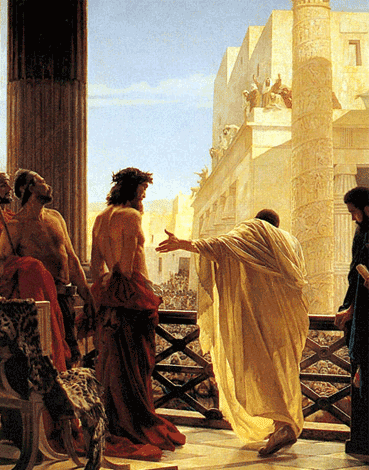 more... more...
"My kingdom is not of this world, or my servants would fight" Pilate answered, "Am I a Jew? Your own nation and the chief priests have delivered you over to me. What have you done? " 36 Jesus answered, "My kingdom is not of this world. If my kingdom were of this world, my servants would have been fighting, that I might not be delivered over to the Jews. But my kingdom is not from the world." 37 Then Pilate said to him, "So you are a king?" Jesus answered, "You say that I am a king. For this purpose I was born and for this purpose I have come into the world-to bear witness to the truth. Everyone who is of the truth listens to my voice." 38 Pilate said to him, "What is truth?" After he had said this, he went back outside to the Jews and told them, "I find no guilt in him
less...
Leo Tolstoy ( 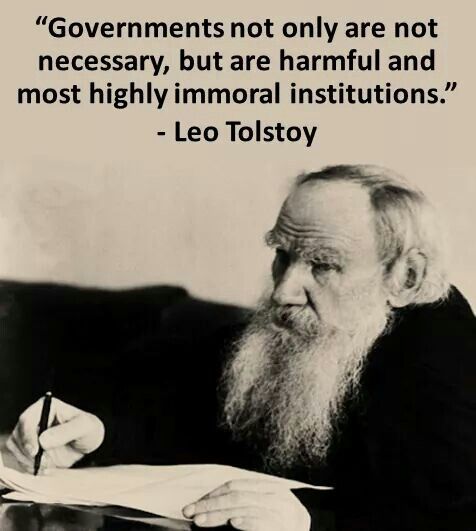 The Kingdom of God is ... The Kingdom of God is ...") [Editor/s note:] Pure pacifist Leo Tolstoy asserted that Jesus’ followers should eliminate military, local police and even landlords. Yet very few governments have successfully resisted fulfilling the second half of his opinion: [ii]"Governments are not only not necessary but are harmful and most highly immoral institutions."
more...
Thus they refuse to pay their taxes voluntarily, because the taxes are used for acts of violence, for salaries to violators and military men, for the construction of prisons, fortresses, cannon, while they, as Christians, consider it sinful and immoral to take part in these things. Those who refuse to take the common oath do so because to promise to obey the authorities, that is, men who are given to acts of violence, is contrary to the Christian teaching; they refuse to take their oath in courts, because the oath is directly forbidden in the Gospel. They decline to serve in the police, because in connection with these duties they have to use force against their own brothers and torment them, whereas a Christian may not do so. They decline to take part in court proceedings, because they consider every court proceeding a fulfillment of the law of revenge, which is incompatible with the Christian law of forgiveness and love. They decline to take part in all military preparations and in the army, because they do not wish to be and cannot be executioners, and do not want to prepare themselves for the office of executioner. All the motives of these refusals are such that, no matter how despotic a government may be, it cannot punish them openly. To punish them for such refusals, a government must itself irretrievably renounce reason and the good; whereas it assures men that it serves only in the name of reason and of the good.
less...
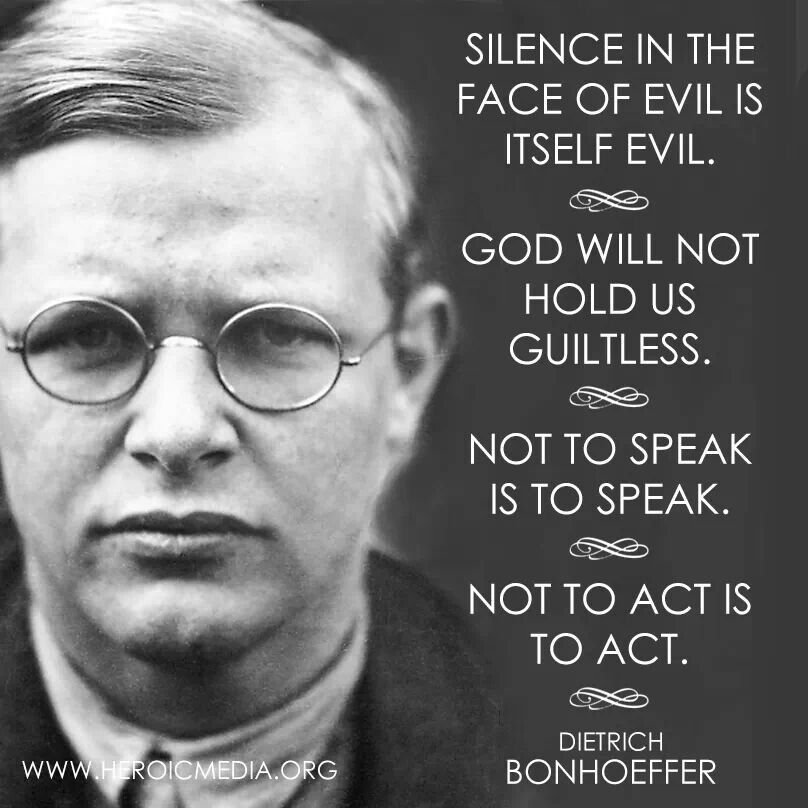 Dietrich Bonhöffer - Pacifist Resistor Brittanica Dietrich Bonhöffer - Pacifist Resistor Brittanica. Bonhöffer worked in a Nazi goverment position with others who secretly saved Jews, supported "illegal" churches, and possibly negotiate with British Navy. Dietrich has been associated with the plot to assassinate Hitler...
"the Church was silent when it should have cried out because the blood of the innocent was crying aloud to heaven. She is guilty of the deaths of the weakest and most defenseless brothers of Jesus Christ."
more...
In 1939 Bonhoeffer considered taking refuge in the United States but returned after only two weeks in New York City, writing to his sponsor, the theologian Reinhold Niebuhr, that "I will have no right to participate in the reconstruction of Christian life in Germany after the war if I do not share the trials of this time with my people." The next year Bonhoeffer charged that "the Church was silent when it should have cried out because the blood of the innocent was crying aloud to heaven. She is guilty of the deaths of the weakest and most defenseless brothers of Jesus Christ." Bonhoeffer and von Dohnanyi responded personally by helping some Jews move to neutral Switzerland.
thinkingpacifism.net
Bonhoeffer refused to fight in the military and found a way to do constructive ecumenical work while not violating his convictions. He was arrested mainly because he was known to have connections with assassination conspirators, but was convicted of draft evasion (in his case, a profoundly pacifist stance), not involvement in the plot. In the end, he was executed. We don't know exactly why, but quite likely simply because he was seen as an enemy of the state (which had been his label from 1933)—one of thousands the Nazis put to death in the final months of the war as a concluding act of revenge. In a nutshell, Mark seems to be making the case that present-day Christians should indeed recognize Bonhoeffer as a Christian martyr. This designation, a common one in relation to Bonhoeffer for many years, has always seemed a bit problematic to me. According to the standard account, Bonhoeffer was not a martyr due to following Jesus, really, but for recognizing the need to quit following Jesus in this extreme circumstance. Mark's picture, though, shows Bonhoeffer as a consistent follower of Jesus all the way. And, it takes away one of the standard examples opponents of pacifism have commonly used. Bonhoeffer died because he was a pacifist, not because he repudiated pacifism.
less...
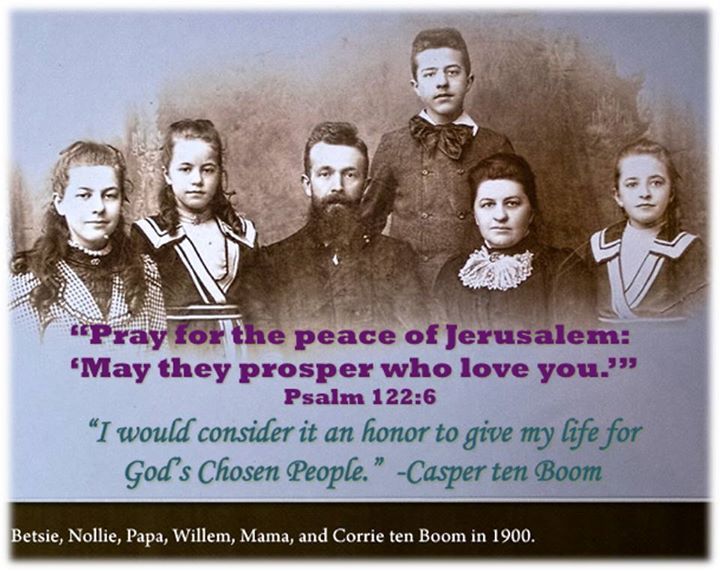 Ten Boom family Ten Boom family "Resisted evil' by serving... Two years after the Blitzkrieg tore through The Netherlands, the Ten Booms joined the Dutch resistance.
more...
Two years after the Blitzkrieg tore through The Netherlands, the Ten Booms joined the Dutch resistance. Due to Corrie's charity work and her family's reputation, she became a connector for the resistance in Haarlem. The Ten Booms were able to procure additional ration cards, and for two years hid Jewish refugees in a specially-designed hidden room in their home. The family was finally arrested in early 1944 due to a Gestapo informant, and Corrie and her sister were eventually moved to the notorious Ravensbruck concentration camp in northern Germany. In December of that year, Corrie's sister, Betsie, died. A few weeks later, on New Year's Eve, Corrie Ten Boom was released from Ravensbruck due to a clerical error. Two weeks after that, all female prisoners of the camp around Corrie's age were killed. Dan Gibson
less...
Irene Sendler 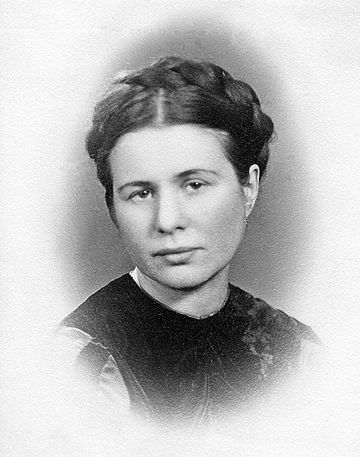 wikipedia wikipedia, Snopes, https://irenasendler.org/"Over a half-century has passed since the hell of the Holocaust, but its spectre still hangs over the world and doesn't allow us to forget."
more...
By 1942, when the deadly intentions of the Nazis had become clear, Sendler joined a Polish underground organization, Zegota. She recruited 10 close friends — a group that would eventually grow to 25, all but one of them women — and began rescuing Jewish children.
When celebrated by a 4 person play in 1999 Irena's secret was discoverd: Irena's comment [to the teen playwrights] ... from Kansas,...
"My emotion is being shadowed by the fact that no one from the circle of my faithful coworkers, who constantly risked their lives, could live long enough to enjoy all the honors that now are falling upon me.... I can't find the words to thank you, my dear girls.... Before the day you have written the play ‘Life in a Jar' — nobody in my own country and few in the whole world knew about my person and my work during the war ..." 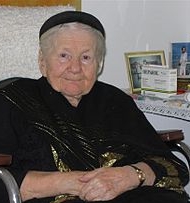
"Over a half-century has passed since the hell of the Holocaust, but its spectre still hangs over the world and doesn't allow us to forget." Irena Sendler's letter to the Polish Senate (2007), as quoted in " Irena Sendler: An Unsung Heroine" by Louis Bulow, http://www.auschwitz.dk. 2007.
less...
|
 George Washington, ibid drexel.edu
George Washington, ibid drexel.edu
 Abraham Lincoln ourdocuments.gov
Abraham Lincoln ourdocuments.gov

 Saved many lives as a medic, injured by grenade, refused to carry a weapon. Respected by his comrades. Subject of "Hacksaw Ridge".
Saved many lives as a medic, injured by grenade, refused to carry a weapon. Respected by his comrades. Subject of "Hacksaw Ridge".
 "...one of the British Army patients who came to know him was afterwards to write: 'I have read of many great Christians. I have met only one - John Watanabe.'".
"...one of the British Army patients who came to know him was afterwards to write: 'I have read of many great Christians. I have met only one - John Watanabe.'".
 more...
more...
 The Kingdom of God is ...")
The Kingdom of God is ...")  Dietrich Bonhöffer - Pacifist Resistor Brittanica. Bonhöffer worked in a Nazi goverment position with others who secretly saved Jews, supported "illegal" churches, and possibly negotiate with British Navy. Dietrich has been associated with the plot to assassinate Hitler...
Dietrich Bonhöffer - Pacifist Resistor Brittanica. Bonhöffer worked in a Nazi goverment position with others who secretly saved Jews, supported "illegal" churches, and possibly negotiate with British Navy. Dietrich has been associated with the plot to assassinate Hitler...
 Ten Boom family "Resisted evil' by serving...
Ten Boom family "Resisted evil' by serving...  wikipedia, Snopes, https://irenasendler.org/
wikipedia, Snopes, https://irenasendler.org/


 http://www.tablefortwo.org/tft_usa/
http://www.tablefortwo.org/tft_usa/ Digi-Hound
Digi-Hound